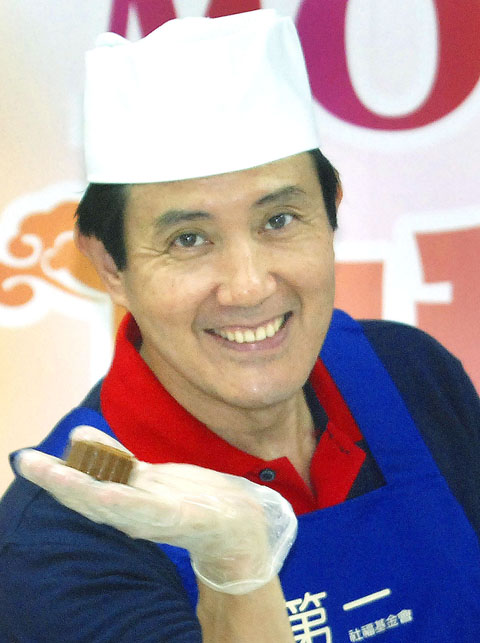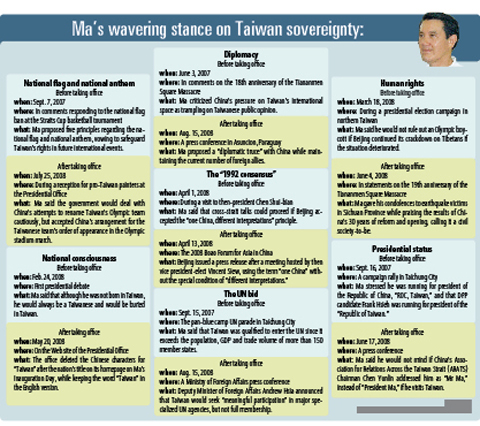On President Ma Ying-jeou’s (馬英九) 100th day in office, analysts questioned the president’s seemingly cavalier approach to sovereignty, cross-strait relations, foreign affairs and other issues.
Ma touched many Taiwanese people’s hearts when he stated many times during his presidential campaign that he is Taiwanese and that he would be buried here in this land as Taiwanese. Shortly after he was elected in March, he adopted a strategy meant to defuse tensions with China, but which has been much criticized by pro-localization advocates.

Photo: AP
In his inaugural address, he called for cross-strait negotiations based on the so-called “1992 consensus” and proposed reconciliation and detente.
The “1992 consensus” describes the notion that the two sides agreed that each could have its own interpretation of what “one China” means, but the “consensus” is not universally recognized as valid in Taiwan.
Acting on his call, both sides resumed talks in June after a decade-long hiatus. Beijing, reluctant to let the pro-independence Democratic Progressive Party (DPP) administration take credit for weekend charter flights and increase in Chinese tourists visiting Taiwan, finally gave the initiatives the go-ahead.

Amid speculation that the administration had asked the US to suspend arms sales to prevent irking Beijing in the run-up to Olympics, Ma has promised to continue purchasing defensive weapons from Washington.
The defense budget, however, was the only government budget that suffered cuts in the budget for next year.
Antonio Chiang (江春男), political analyst and former editor-in-chief of the Taipei Times, said he was most worried about Taiwan’s future because the goal of the Ma administration was to unify with China although Ma did not want to admit it on record.
“Before he was elected, he kept saying that he loved Taiwan, but now he doesn’t say it any more,” Chiang said.
Ma’s biggest problem, Chiang said, was that he could not care less about sovereignty, foreign affairs or democracy. Ma has been too optimistic in his expectations for China, while largely ignoring the US and Japan, he said.
“He thought the country’s relationship with other countries would improve if cross-strait relations made headway,” Chiang said. “When we totally count on Beijing’s goodwill, there won’t be any peace in the Taiwan Strait.”
One hundred days into his presidency, Chiang said Ma has completely wiped out what the former DPP administration had worked for over the past eight years.
Some of Ma’s tactics involved a series of largely symbolic gestures that reversed actions taken by the former DPP administration that China found objectionable.
Examples include removing the Chinese characters for “Taiwan” from the presidential Web site and changing back the name of the state-run postal company to Chunghwa Post after the name was dropped by the former DPP administration because it contained the word “Chinese.”
The Ma administration is also mulling changing the name of the National Taiwan Democracy Memorial Hall back to Chiang Kai-shek Memorial Hall.
Ma also took pride in having Beijing use the name “Chinese Taipei” in its media’s reference to the Taiwanese Olympic team and praised Beijing’s change of heart as a diplomatic feat.
Chiang said using different tactics was worth a try, but they must be backed by a well-thought-out plan and implemented by a competent and professional team. Unfortunately, the Ma administration had neither, he said.
On the diplomatic front, Ma proposed a “diplomatic truce” with Beijing and said that Taiwan would concentrate more on cementing ties with existing diplomatic allies than seeking to make new friends.
Instead of seeking full membership in the UN, the Ma administration this year applied for “meaningful participation” in the UN’s 16 auxiliary agencies, touting the approach as “pragmatic” and “flexible.”
While the Ministry of Foreign Affairs said it was “not too surprised” at Beijing’s objection to the bid, the Presidential Office described Beijing’s reaction as an “isolated case” and asked the public to refrain from interpreting it as “ill will.”
Describing Ma’s proposed “diplomatic truce” with Beijing as a “diplomatic holiday,” Chiang said Taiwanese diplomats must be happy as they have little to do since the Chinese Nationalist Party (KMT) government’s agenda does not stress securing more diplomatic allies.
“I am not saying foreign policy cannot be adjusted, but it is dangerous to pin all one’s hopes on Beijing’s goodwill,” he said.
While the “diplomatic truce” and efforts toward peace concern sovereignty, Chiang said it was wishful thinking that both sides could build peace on nothing.
In addition to sovereignty and diplomacy, political observers also expressed concerns that improved cross-strait relations could affect Ma’s defense policy, though they were split on how much influence easing cross-strait strain would have on the administration’s plan to purchase weapons from the US.
Antonio Hsiang (向駿), a research fellow at the Society for Strategic Studies, said that while Ma had promised to keep the defense budget at 3 percent of GDP, improved cross-strait relations were expected to have some impact on arms procurement packages from the US.
However, he said he did not think the administration would significantly cut the arms procurement budget because there were too many interests involved.
While Ma has proposed establishing a military confidence-building mechanism with Beijing, Hsiang said Washington’s attitude was key.
“I don’t think Taipei and Beijing trust each other enough to want to sit down and talk about such a possibility unless Washington is willing to mediate,” he said.
Washington might not want to see peace happen in the short term in the Taiwan Strait because if there was peace, there would be fewer arms deals, which would mean fewer business opportunities, he said.
Wang Kao-cheng (王高成), director of the Graduate Institute of International Affairs and Strategic Studies at Tamkang University, however, said that improvements in cross-strait relations would not affect arms procurement projects.
“The administration has never said that they would stop buying weapons from the US,” he said. “The problem lies in Washington’s delay in approving the deals rather than Taipei’s reluctance to buy them.”
If Washington genuinely cared about peace in the Taiwan Strait, Wang said, it should have approved the package after the legislature approved the budget because cross-strait peace would tally with US interests.
Aside from arms procurement, Wang called into question Ma’s campaign promise of replacing the conscription system with recruitment of volunteer soldiers within four years to six years.
He urged the administration to map out a better-thought-out plan before rushing to put Ma’s election promise into practice.
Hsiang said he would like to see Ma take a more pro-active approach in performing his presidential duty of setting policies concerning cross-strait relations, national defense and foreign affairs.
Ma should spend more time setting those policies and leave the rest to the premier, he said, because, after all, he is no longer the mayor of the capital city.

“China is preparing to invade Taiwan,” Deputy Minister of Foreign Affairs Francois Wu (吳志中) said in an exclusive interview with British media channel Sky News for a special report titled, “Is Taiwan ready for a Chinese invasion?” the Ministry of Foreign Affairs said today in a statement. The 25-minute-long special report by Helen Ann-Smith released yesterday saw Sky News travel to Penghu, Taoyuan and Taipei to discuss the possibility of a Chinese invasion and how Taiwan is preparing for an attack. The film observed emergency response drills, interviewed baseball fans at the Taipei Dome on their views of US President

ECONOMIC BENEFITS: The imports from Belize would replace those from Honduras, whose shrimp exports have dropped 67 percent since cutting ties in 2023 Maintaining ties with Taiwan has economic benefits, Ministry of Foreign Affairs officials said yesterday, citing the approval of frozen whiteleg shrimp imports from Belize by the Food and Drug Administration (FDA) as an example. The FDA on Wednesday approved the tariff-free imports from Belize after the whiteleg shrimp passed the Systematic Inspection of Imported Food, which would continue to boost mutual trade, the ministry said. Taiwan’s annual consumption of whiteleg shrimps stands at 30,000 tonnes, far exceeding domestic production, the ministry said. Taiwan used to fill the gap by importing shrimps from Honduras, but purchases slumped after Tegucigalpa severed diplomatic ties with Taiwan

The Executive Yuan yesterday approved a southwestern extension of the Sanying MRT Line from New Taipei to Bade District (八德) in Taoyuan, with a goal of starting construction by late 2026. The 4.03-kilometer extension, featuring three new stations, will run from the current terminus at Yingtao Fude Station (LB12) in New Taipei City to Dannan Station (LB14), where it will connect with Taoyuan’s Green Line, New Taipei City Metro Corp said in a statement. This extension will follow the completion of core Sanying Line, a 14.29-kilometer medium-capacity system linking Tucheng (土城), Sansia (三峽)

CARGO LOSS: About 50 containers at the stern of the ‘Ever Lunar’ cargo ship went overboard, prompting the temporary closure of the port and disrupting operations Evergreen Marine Corp, Taiwan’s largest container shipper, yesterday said that all crew members aboard the Ever Lunar (長月) were safe after dozens of containers fell overboard off the coast of Peru the previous day. The incident occurred at 9:40am on Friday as the Ever Lunar was anchored and waiting to enter the Port of Callao when it suddenly experienced severe rolling, Evergreen said in a statement. The rolling, which caused the containers to fall, might have been caused by factors including a tsunami triggered by an earthquake in Russia, poor winter sea conditions in South America or a sudden influx of waves,